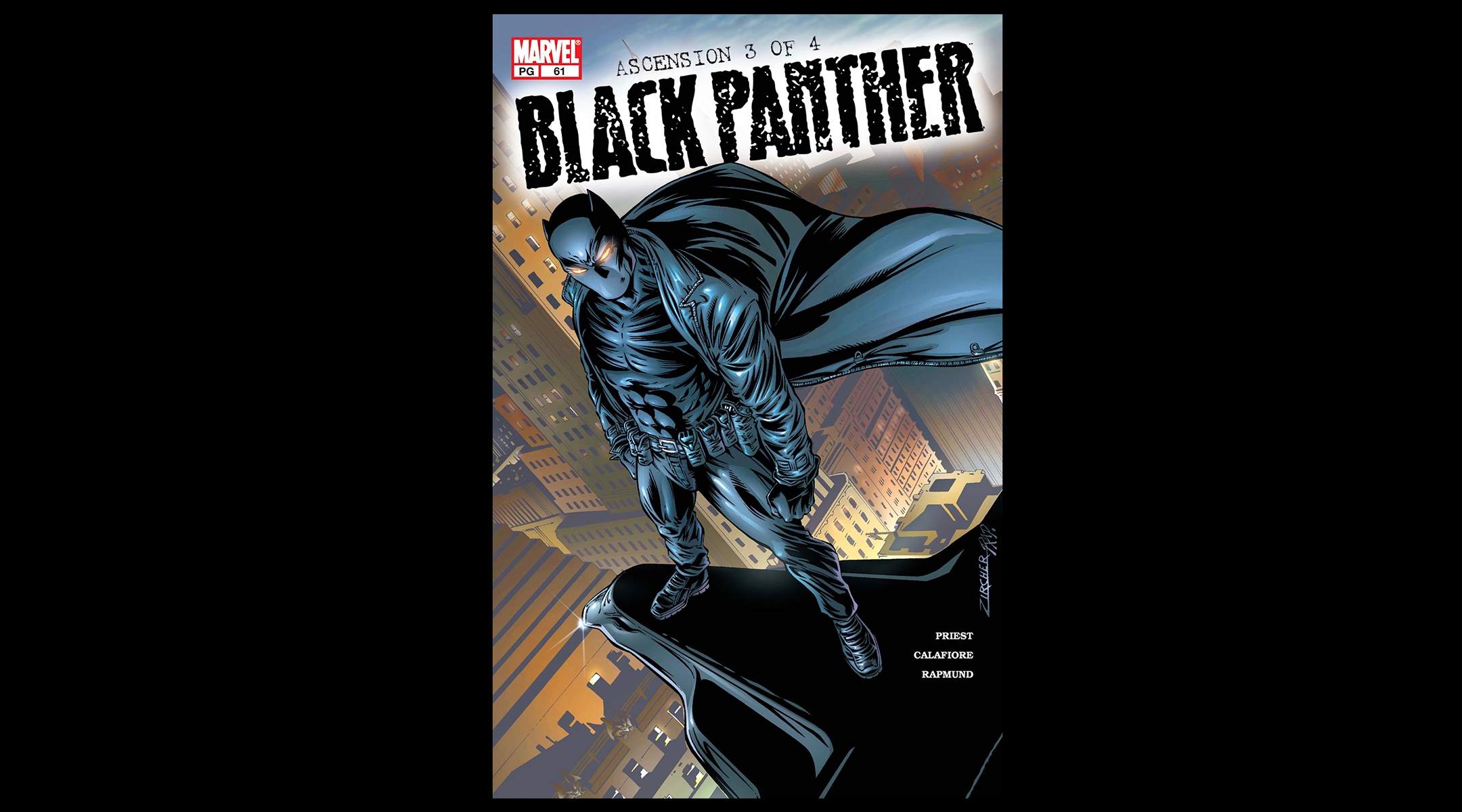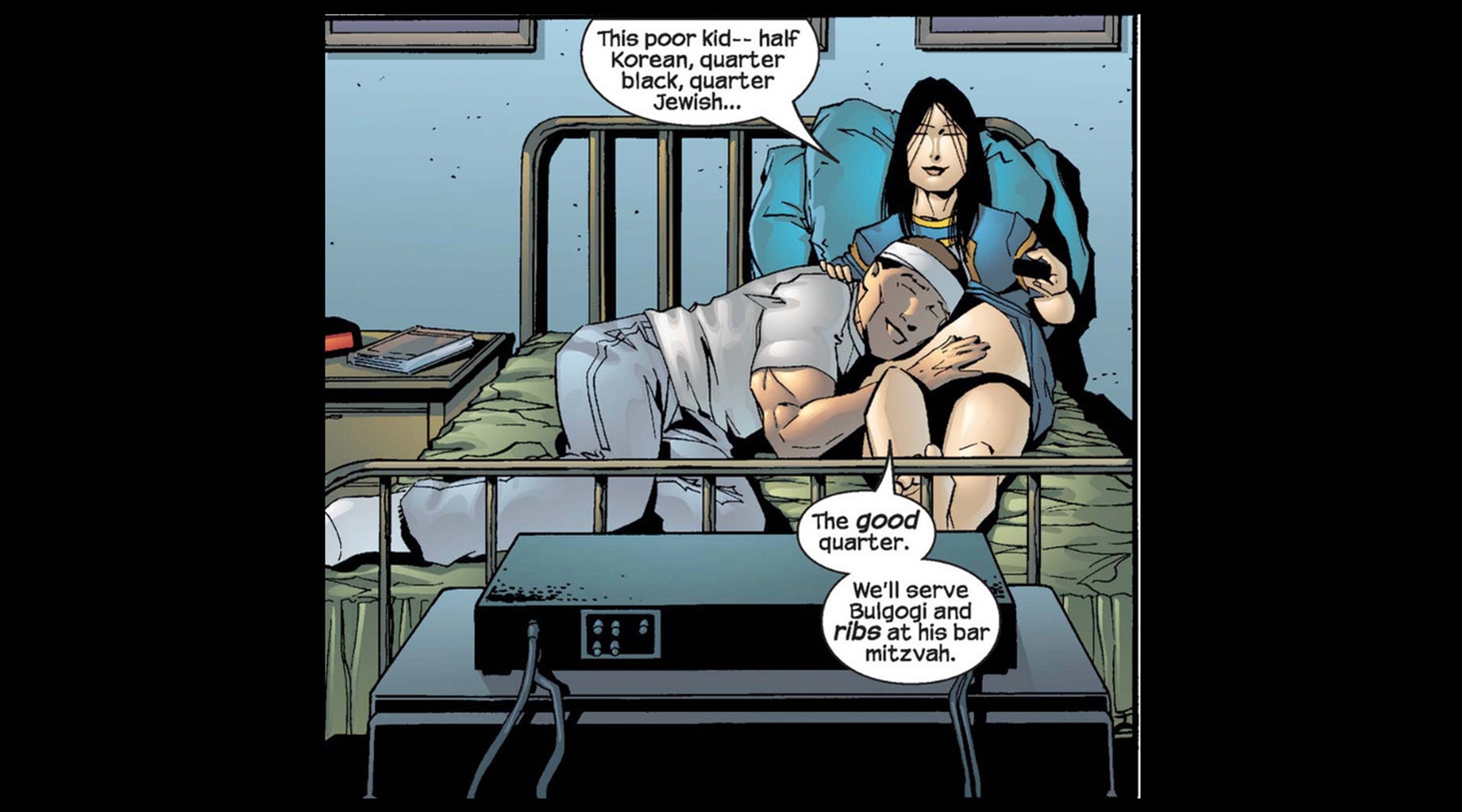20 years ago, Marvel introduced a Jewish Black Panther

Kevin “Kasper” Cole temporarily succeeded T’challa, the original Black Panther. (Marvel Comics)
(JTA) — Like some Jewish baseball fans, many dedicated Jewish comic book readers keep a running roster of Jewish heroes that have appeared in the “major leagues” of the comic world: Marvel, DC and some independent publishers’ titles.
Many know the handful of often-discussed Jewish characters: The Thing, whose adult bar mitzvah and Jewish wedding were major storylines; the Jewish star-wearing X-Men character Kitty Pryde; one-time Batwoman Kate Kane; and the popular supervillain Harley Quinn, to name a few. Moon Knight recently became the first overtly Jewish character to appear in the so-called Marvel Cinematic Universe, with his own show on Disney+ starring Oscar Isaac.
But not many readers are aware that, for a brief period exactly 20 years ago, the most overtly Jewish of all mainstream superheroes was the Black Panther.
Marvel’s original Black Panther character debuted in the summer of 1966, coincidentally just months before the launch of Bobby Seale and Huey Newton’s political party of the same name. Like Superman, Batman, Spider-Man and Captain America, the first mainstream Black superhero was created by Jewish comic book legends, in this case the dynamic duo of Jack Kirby (born Jacob Kurtzberg) and Stan Lee (born Stanley Lieber).
The Black Panther first appeared in a “Fantastic Four” issue, and is also known as T’Challa, the king and protector of the fictional African nation of Wakanda, a technologically advanced society hidden from the world. T’Challa possessed superhuman abilities, advanced technology and unmatched combat skills, and was considered one of those most brilliant men alive. The character and his storylines explored themes of identity, heritage and the responsibilities that come with power.
At the time of its creation, a strong, positive portrayal of an African superhero that defied stereotypes was a significant milestone in representation and diversity in the comic book industry. The Black Panther’s impact has been far-reaching, inspiring generations of readers as an enduring symbol of Black empowerment and pride.
Flash forward several decades after the character’s debut, and comics creator Christopher Priest was nearing the end of a transformative 60-issue run at the helm of the Black Panther title. Priest was the first Black writer to work full time at either of the big two studios, and his trailblazing reinvention of the character served as the primary inspiration for the two blockbuster movies that have earned acclaim in recent years.
In the final dozen issues of Priest’s “Black Panther” series, the story took a surprising turn. T’challa had vanished and was presumed dead. In his stead, a new Black Panther appears mysteriously on the scene: Kevin “Kasper” Cole, a narcotics officer in the NYPD’s Organized Crime Control Bureau.
Cole’s father was born in Uganda, but Kevin lives in a tiny apartment in Harlem with his Korean girlfriend, Gwen, and his Jewish mother, Ruth. Kevin is known as “Kasper” — after the well-known Casper the Friendly Ghost cartoon — because, as he puts it:
There once was the greatest cop who ever lived. A proud and noble warrior, someone to be both feared and respected. Jonathan Payton Cole. “Jack” Cole. Called him “Black” Jack because he was so dark. Just like they called his kid “Kasper,” because I was so light.
Meanwhile, Priest modeled Ruth after the mother on “Everybody Loves Raymond,” played by Jewish comedic actress Doris Roberts.
Cole originally “borrows” the Black Panther costume from the home of his boss, Sgt. Tork, an ally of T’challa who had held on to the costume for safekeeping. Cole’s motives were hardly altruistic, as Priest wrote on his blog at the time: “Kasper’s motive is to wear the costume so he won’t be recognized by the good guys or the bad guys as he goes about cleaning up his precinct so he can get a promotion to Detective so he can make enough money to marry his pregnant girlfriend and move them all out of Harlem.”
But what starts out as a side hustle for Cole soon evolves into a hero’s journey. When Cole is discovered by T’challa’s longtime adversary and half-brother, Hunter — AKA The White Wolf — he provides Cole with training, equipment and mentorship in order to use Cole as a proxy to hurt T’challa, who has resurfaced in New York City. The story soon becomes, in Priest’s words, “a war between The Black Panther (T’Challa) and the ‘white panther’ (Hunter) over the soul of this young kid.”
The story doesn’t end there: Cole decides to pursue official Wakandan acceptance as Black Panther by enduring rigorous initiation trials, and he soon receives support from none other than Erik Killmonger (the villain in the first “Black Panther” movie). Killmonger offers Cole a synthetic version of a heart-shaped herb, giving him T’challa-level powers. The series ends when Cole agrees to become an acolyte of the Panther god, Bast, instead of living as an imitator. He assumes a new title, The White Tiger (thereby becoming the second Jewish Marvel hero after Moon Knight to dress all in white and serve at the pleasure of an African deity).
Throughout the series, Cole’s Judaism is not a mere aside. Priest provides numerous examples of a strong Jewish identity: He dreams of his unborn son having a bar mitzvah (where they will serve “Bulgogi and ribs”). He dons a kippah and recites a Hebrew prayer at the grave of his slain friend and boss, Sgt. Tork. Even Erik Killmonger refers to Cole’s Jewish identity as a reason why Cole would identify with the underdog. Cole also proudly mentions his Jewish identity to several other characters in both Black Panther and in Priest’s short-lived follow-up series, “The Crew.”
(Priest originally envisioned the ensemble for “The Crew,” which wound up being mostly Black heroes, to be a much more diverse group, including not only Cole but also the one-time Avenger and New Warrior, Vance Astrovik, AKA Justice. That would have meant an unprecedented two Jewish superheroes on one team.)

One reason why Priest decided to make Cole Jewish could have been his personal familiarity with Jews. Priest himself went to a primary school in a Jewish neighborhood in New York City, where, he writes, “I had absolutely no sense of racism being directed at me… If I had a beef with another boy, it was about whatever it was about—race played absolutely no role… At least half of my friends were white. Right up through middle school, my girlfriend was a little Jewish girl.”
Fabrice Sapolsky, CEO and Founder of FairSquare Comics — which aims to “promote and give more exposure to immigrants, minorities and under-represented creators of the word” — hopes that Cole will not be the last comic character to represent an understanding of Jewish ethnicity beyond the “Ashke-narrative trope.”
“It is the right time for these kinds of stories to emerge,” said Sapolsky, who recently published a book starring an Asian-Jewish protagonist. He said he is also releasing a title soon that features a Black-Jewish heroine.
Cole’s journey has continued in a new series written by Ta-Nehisi Coates, over a dozen years after his first appearance (or 1-2 years in “Marvel time”). In the Coates narrative, T’challa convinces Cole to come out of superhero retirement and move to Wakanda. T’challa offers to train and outfit him not as The Black Panther or The White Tiger, but as an entirely new hero, simply known as Kevin Cole. In the most recent issues, he defends Wakanda alongside a veritable who’s-who of Black Marvel superheroes.
“One of the prime directives at Marvel has always been to create characters that resemble the world and people we know, that are around us,” Mike Marts, Priest’s editor on “Black Panther,” said about the groundbreaking representation that a Black-Jewish hero represents. “So making Kevin half-Jewish was most likely a result of collaboration between us (Marvel) and Priest… to create a character that our readers could identify with and relate to.”
This article originally appeared on JTA.org.

I hope you appreciated this article. Before you go, I’d like to ask you to please support the Forward’s award-winning journalism this Passover.
In this age of misinformation, our work is needed like never before. We report on the news that matters most to American Jews, driven by truth, not ideology.
At a time when newsrooms are closing or cutting back, the Forward has removed its paywall. That means for the first time in our 126-year history, Forward journalism is free to everyone, everywhere. With an ongoing war, rising antisemitism, and a flood of disinformation that may affect the upcoming election, we believe that free and open access to Jewish journalism is imperative.
Readers like you make it all possible. Right now, we’re in the middle of our Passover Pledge Drive and we still need 300 people to step up and make a gift to sustain our trustworthy, independent journalism.
Make a gift of any size and become a Forward member today. You’ll support our mission to tell the American Jewish story fully and fairly.
— Rachel Fishman Feddersen, Publisher and CEO
Join our mission to tell the Jewish story fully and fairly.
Only 300 more gifts needed by April 30























